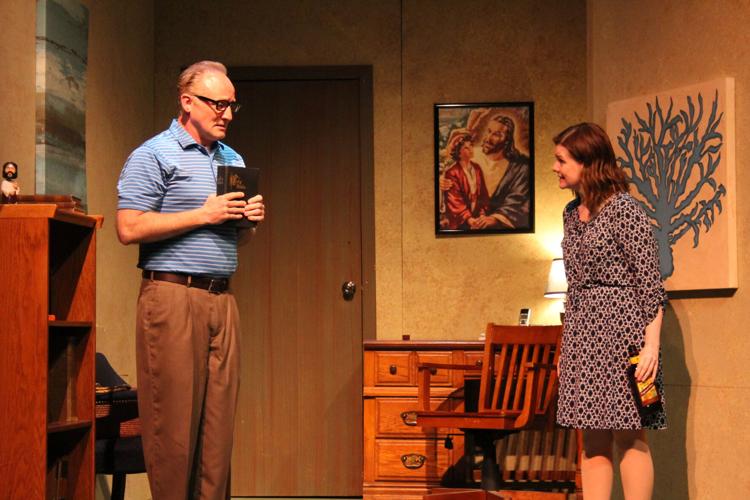By Lynn Venhaus
Two words: Demented puppets. In this “Avenue Q” meets “Book of Mormon” pitch-black comedy, “Hand to God” builds audacity and unease in equal measure as the audience’s raucous laughter grows.
As edgy as St. Louis Actors’ Studio can get, this brazen work is unlike anything you have previously seen in the intimate Gaslight Theatre black box. The laugh-out-loud guffaws are as frequent as the jaw-dropping gasps.
How this crackerjack ensemble of three men and two women maintains straight faces throughout interactions over two acts is indeed admirable. Director Andrea Urice takes a bold approach with the characters and keeps a brisk pace as actions become darker and more disturbing.
Playwright Robert Askins bluntly presents an outrageous premise that involves Christian faith, sin, righteousness, demonic possession and dealing with teenage angst in a modest small-town church setting.
Those easily offended should be warned – not only is the language obscene, but so are the puppets Tyrone and Joleen, who engage in explicit sex acts in one scene.
During Christian Puppet Ministry rehearsals in a church basement, one mild-mannered but conflicted teen, Jason, has lost control of his puppet Tyrone, who seems to have taken on an alarming identity, hell-bent to harm others, including his puppeteer.
Jason, as played by Mitch Henry-Eagles, is a meek young man whose complicated relationships with his widowed mother Margery (Colleen Backer), the vulgar school bully Timmy (Josh Rotker), the assertive girl-next-door Jessica (Phoebe Richards), and the town pastor (Eric Dean White), fuel the dual personalities.
Normally, puppets are used in church programs to teach young children Bible lessons, but this scenario is an upside-down bizarro world. Jason’s mom takes charge of the puppet club that has only three teenagers in it.
As Jason’s behavior turns more unsettling as his homemade bad-boy Tyrone takes over, so does the exasperation and shock of the people around him, who have their own complex issues, which also leads to wildly inappropriate behavior in the polite Christian circle.
Tyrone, at first, acts like a philosopher who has little tolerance for fools and piety. Is it Jason expressing his true self? His profanity-laced tirades take aim at hypocrisy in complacent society. He acts like he’s telling tales around the campfire – but pours gasoline on with uncomfortable truths.
Much of what Tyrone says is funny, even when it is offensive. Conveying intensity and impertinence, Henry-Eagles handles the long-winded puppet rants skillfully – it doesn’t matter that there is little pretense as to which character is talking.
He affects an interesting vocal cadence as his alter-ego, part-infuriated and part-world-weary. With crisp comic-timing, he makes this dialogue crackle – and nimbly says the most outrageous things matter-of-factly, not unlike how the iconoclastic “South Park” creators Trey Parker and Matt Stone present their young cartoon characters.
But these ingrained church-going characters in Cypress, Texas (the playwright’s hometown), are flesh and blood, with the operative word “blood” here – Tyrone has now developed razor-sharp teeth and blood-red devil eyes. Could he be Satan?
The demonic tone and chaos indicates the Prince of Darkness has taken hold of Tyrone, using hapless Jason as his evil conduit, and although plans to conduct an exorcism aren’t followed through, things take a sharp turn to the dark side. Sinful behavior is acted out, destruction of property takes place, and Tyrone expresses painful secrets that the horrified characters wanted to keep to themselves.
Henry-Eagles has excelled in challenging roles before – particularly in “Trash Macbeth,” “Oedipus Apparatus” and “Titus Androgynous,” but none as demanding as the anxious boy-rascal puppet combo.
Askins used the phrase, “hand to God,” which conjures up truth-telling, as the title to his no-holds-barred portrait of Fundamentalist Christian characters and his views on faith, morality and our community and family ties.
The irreverent play ran off-Broadway in 2011 and 2014, earned an Obie Award, then transferred to Broadway in 2015 – later featuring Bob Saget as Pastor Greg. Nominated for Best Play and four other Tony Awards, the satire capitalizes on embracing the full-throttle naughtiness while trashing society’s niceties.
The play’s construction is rather choppy, meant to shock and be subversive. While it is thought-provoking, especially on the concepts of saviors and demons, it is inconclusive on purpose, preferring to leave things open to interpretation. The stitched-together feeling – and what appears to be a rushed ending — is a minus while the performances are laudatory.
As the characters become sexually attracted to each other, upheaval ensues – and this cast demonstrates their fearlessness.
Colleen Backer, one of the St. Louis Actors’ Studio’s best regulars, is a gifted comedienne whose strength is appearing to be a normal woman with a sweet demeanor, but her characters are often down-and-dirty deviants – criminally or sexually. Here, she’s a repressed widow whose libido is unleashed by a much younger not-of-age kid. Her actions are as startling as what she blurts out unfiltered.
As the troublemaker Timmy, Josh Rotker is crass in an impish way, and Phoebe Richards’ Jessica is a typical bland teenage girl – until she’s not, using her risqué puppet to act out her urges.
As the well-meaning Pastor Greg, Eric Dean White smoothly handles the thankless role with aplomb. He’s trying to make sense of a spooky Christian Hell dream and is flummoxed on how to lead his congregation into the light without any collateral damage.
The cast moves well on stage, with both a fight choreographer – Cameron Ullrich, and an intimacy choreographer – Dominique “Nikki” Green enlisted to aid the cast.
Scenic Designer Patrick Huber again astounds – not because it’s an elaborate, intricate set like “The Little Foxes” or “August, Osage County,” but because he makes three different set pieces work in an imaginative way, moving a wall to facilitate. The church may be a drab place for spiritual activities, but Huber’s functional movement is impressive.
At the start of the second act, we see a distressing site in the worship space – crucified dolls, mutilated stuffed animals and graffiti. Jenny Smith’s efforts in props and puppet design are terrific – and eye-catching.
Lighting designers Patrick Huber and Steven J. Miller modulate the eeriness, the normal set demands, and a pesky overhead lightbulb that may have a mind of its own for noteworthy illumination.
Robin Weatherall’s sound design adds to the overall creepy vibe and Teresa Doggett’s costume design depicts small-town Texans (of course Pastor Greg is in a polo shirt and khakis).
The characters’ naivete takes a dive into the deep end of the pool, baptized by hellfire. They are changed forever, and it would have been interesting to see what happened next. The mischief was fun, and the cast good sports, but…nagging questions remain.
Still, the knives are sharp, the barbs are pointy and the humor acerbic. Whether you have fun or not will depend on how comfortable you are with boundary-pushing situations on stage.
The St. Louis Actors’ Studio presents “Hand to God” April 8-24, with Fridays and Saturdays at 8 p.m. and Sundays at 3 p.m. at the Gaslight Theatre, N. Boyle Ave., in the Central West End. The play contains adult themes and language – discretion is advised. For more information: www.stlas.org or call box office at 314-458-2978. Seating is limited.

Patrons must wear masks inside the building. The Gaslight is a fully vaccinated theater – please provide proof of vaccination in advance and it will be kept on file at the box office or bring it on the day of the show. There will be hand sanitizer and disposable masks available as well.

Lynn (Zipfel) Venhaus has had a continuous byline in St. Louis metro region publications since 1978. She writes features and news for Belleville News-Democrat and contributes to St. Louis magazine and other publications.
She is a Rotten Tomatoes-approved film critic, currently reviews films for Webster-Kirkwood Times and KTRS Radio, covers entertainment for PopLifeSTL.com and co-hosts podcast PopLifeSTL.com…Presents.
She is a member of Critics Choice Association, where she serves on the women’s and marketing committees; Alliance of Women Film Journalists; and on the board of the St. Louis Film Critics Association. She is a founding and board member of the St. Louis Theater Circle.
She is retired from teaching journalism/media as an adjunct college instructor.

